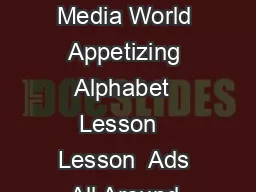PPT-Lesson 10 Collect epitaphs
Author : faustina-dinatale | Published Date : 2018-10-06
Epithet and Apostrophe Chicago by Carl Sandburg OBJECTIVE Students will analyze the effect epithet and apostrophe have on the poem Chicago Carl Sandburgs Chicago
Presentation Embed Code
Download Presentation
Download Presentation The PPT/PDF document "Lesson 10 Collect epitaphs" is the property of its rightful owner. Permission is granted to download and print the materials on this website for personal, non-commercial use only, and to display it on your personal computer provided you do not modify the materials and that you retain all copyright notices contained in the materials. By downloading content from our website, you accept the terms of this agreement.
Lesson 10 Collect epitaphs: Transcript
Download Rules Of Document
"Lesson 10 Collect epitaphs"The content belongs to its owner. You may download and print it for personal use, without modification, and keep all copyright notices. By downloading, you agree to these terms.
Related Documents














